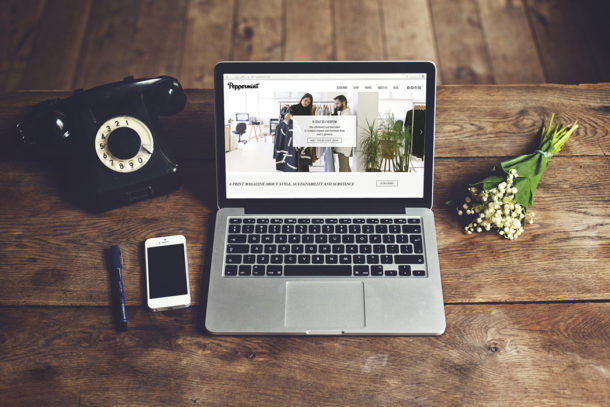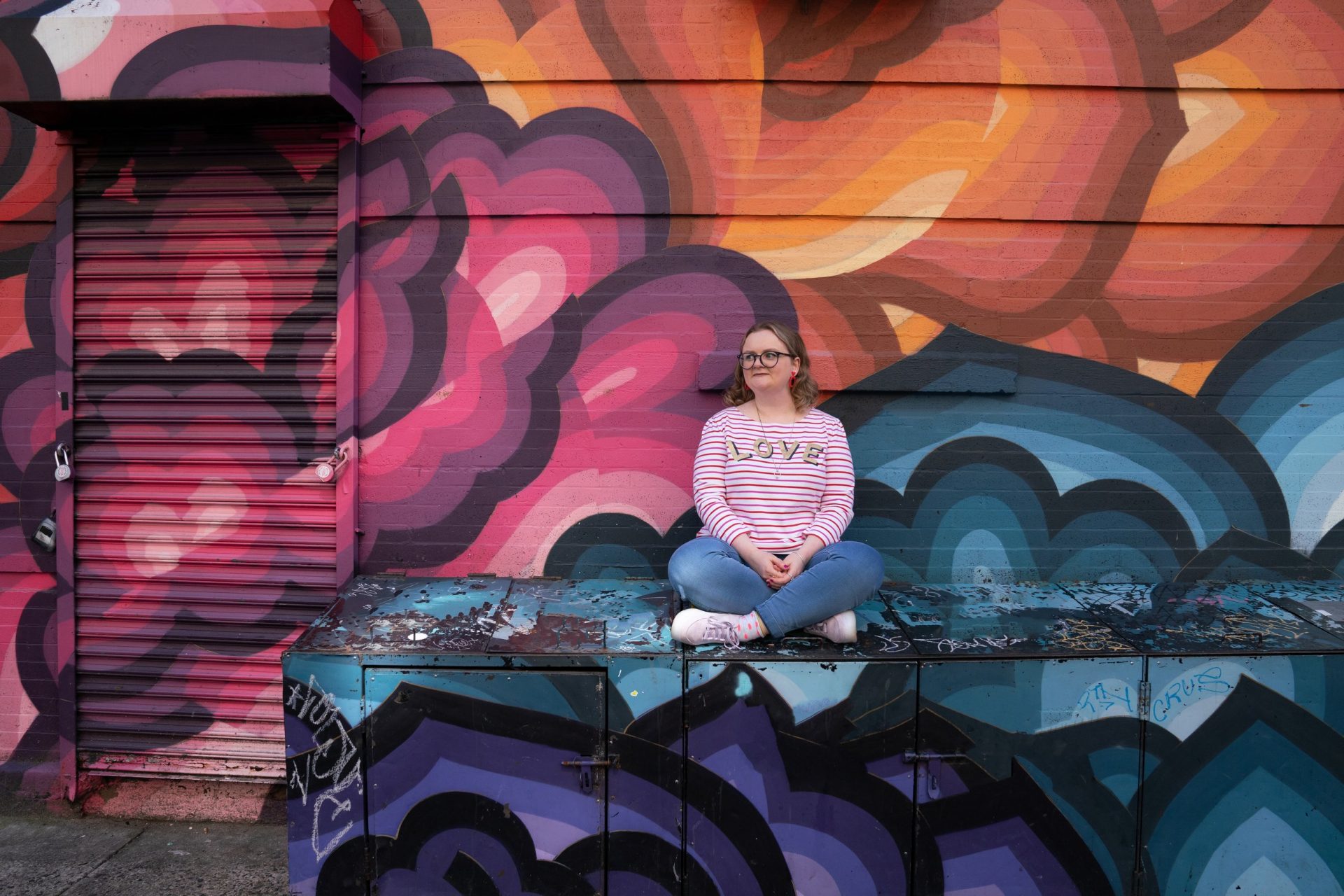
The Joyful Everyday
Octavia Bromell is an illustrator with one goal – to find the joy in everyday life. She’s an Adobe Creative Resident based in the UK who began drawing after she was diagnosed with clinical depression and severe anxiety three years ago. Octavia works remotely from her own studio in a shepherd’s hut in Dorset as part of the Creative Residency programme with Adobe. Peppermint’s Editor-in-chief Kelley Sheenan was lucky enough to travel to the Adobe Max conference in Los Angeles in November last year (thanks Adobe!), where she caught up with a few of the Creative Residents, including the incredibly talented Octavia.
Can you tell us how your art and mental health are intertwined?
I’ve been struggling with my mental health for the better part of two decades – I actually first started drawing as therapy. I was fortunate enough to get to the point where I was earning money for my illustrations, but it wasn’t really doing things that were fulfilling me. This was a really weird place for me to be at, since the whole point of me drawing in the first place was to make my life better.
I had this light bulb moment where it became very important to me to try and build my experience with mental health into my career. I think it’s something I’ll probably be dealing with for the rest of my life. Fortunately I’m at the point now where I am managing it, which is great, but I think that any career I have needs to be mindful of my mental health and the things that make life sustainable for me.
What are you working on at the moment?
I’m currently working on this project called The Joyful Everyday, which is the concept that you can find happiness in whatever life you currently have. This is definitely something I had to learn the hard way, and it’s something that seems to really resonate with people. It’s one of the most exciting things for me to be able to talk to people about illustration and creativity, and also the intersection with mental health.
I think everyone deals with some form of depression or anxiety throughout their life, but maybe mine is on a bigger scale than most people. I feel that it’s something everyone can relate to, right down to work, stress and normal life pressures… anything can get overwhelming. Creativity has really been a great outlet for me to deal with that – to thrive, instead of just surviving.
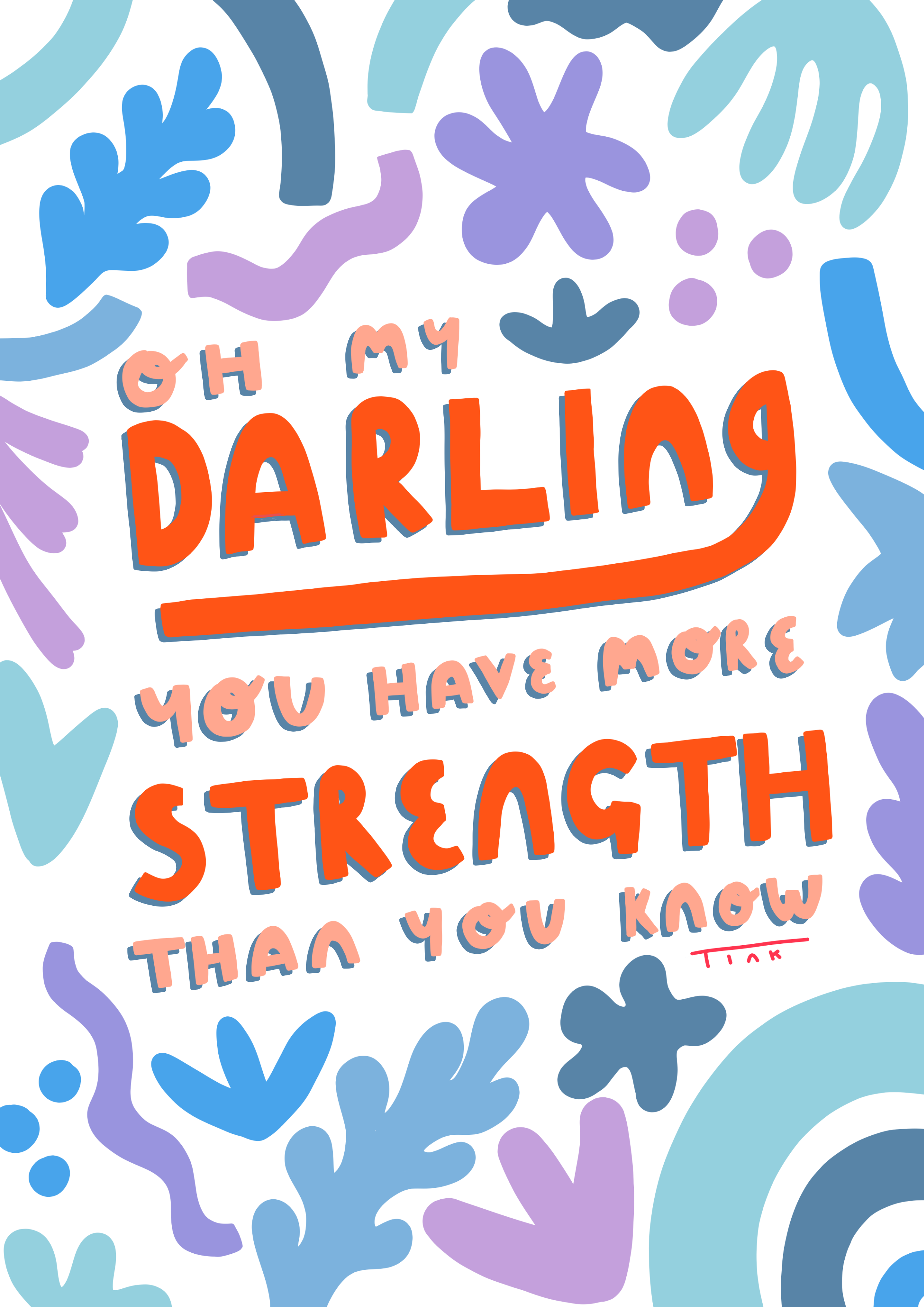
How did you come to be on this creative path?
I did art at school, but I don’t think I picked up a pencil until I was about 14, and definitely not seriously. I didn’t have a good art teacher – she made sure that everyone in the class knew they weren’t good at art, which was a really discouraging experience. Honestly, I don’t think it even entered the realm of possibility that it would be something that I would go on to make a career out of.
Weirdly, I always say there’s a part of me that’s grateful for having a nervous breakdown, because the harsh reality is I don’t think I would have ever had that amount of time to actually be like, “What makes me happy?”
I think so much of life is doing exams and then more exams and then bigger exams. Then you figure out if you want to go to uni and what you want to study, and then you’re like, “Okay, well, I’ve invested all this time in studying, so I have to go and make a career of it.”
A lot of the time people don’t take the time to figure out what they want to do and what fulfils them. You have to choose so young what you want your life’s purpose to be, when the reality is that it changes for almost everyone. So there’s a part of me that’s grateful to my depression, for giving me the space to figure out that drawing is what I want to do.
So there’s a part of me that’s grateful to my depression, for giving me the space to figure out that drawing is what I want to do.
When did things start to get difficult for you and your mental health?
I was studying for a masters in journalism in London. I’d been living and studying in London for five years, I was going out all the time, and I was working really hard. Basically I was just trying to push it under the rug, I guess. Because it started so young, it didn’t really strike me as weird. I’m my only experience of what a human being is. I kind of thought that was what every person in the world felt like – I didn’t really figure out what was going on until I had my mental breakdown when I was 22. This seems odd to look back on, because by that point I’d felt suicidal every day for six months. I think things just spiralled so out of control.
Luckily I have amazing parents and I moved back to my childhood home in Dorset, which isn’t something I ever thought I would do. I was very keen to leave Dorset when I left home at 18 to go to London, and I never thought I’d go back. Now I love how calm it is – there are no street lights in my village. That’s my qualifier for people of how rural it is, and I absolutely love it. It’s great.
What inspires you and your art?
I’ve just finished a 100 day project on The Joyful Everyday. Every day I picked something that brought me joy and I drew that to share with people. So I’m fresh from finding direct inspiration of what is actually nice in my immediate surroundings.
But speaking more broadly than that, I’m really inspired by beautiful things and strong people. My parents run an auction house, so growing up I was constantly surrounded by antiques and knick-knacks, and that’s definitely reflected in my style. I love trinkets, and flea markets and charity shops are my favourite things. But then strong people, especially strong women, I would say feature very heavily in my work.
I consume a lot of culture, and most of my inspiration comes from watching films and listening to music and podcasts, as well as coming to conferences and meeting inspirational people.
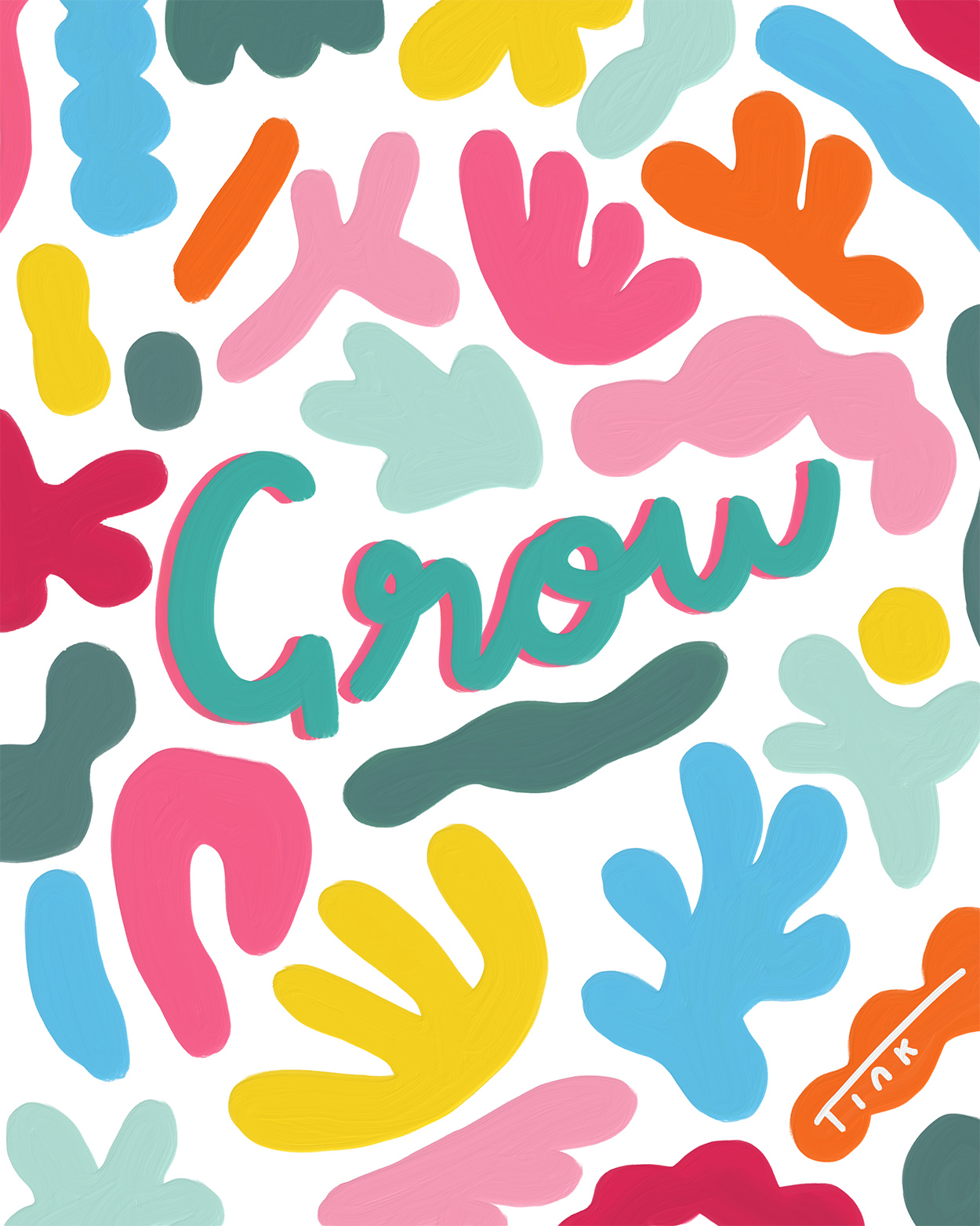
Do you feel the Adobe residency and your art has helped your mental health in some way?
Yes, definitely. I like to describe it as kind of a rolling gratitude journal. With the Adobe residency I actually have the luxury of time to sit down and draw something every day. That’s the whole point of it! So that was a really positive experience for me. I love doing observational drawing, and I love people watching. A lot of that is drawing from my Joyful Everyday project.
I’m sure I don’t need to tell you that studies have shown that building gratitude into your life is incredibly important. I was reading something the other day that said it can actually slow down ageing as well. So that’s an added bonus to my career that I wasn’t expecting!
How have people responded to what you’re doing – have others connected well with you or your art?
Every time I post something on socials about my mental health, or how I’m doing, or just being honest, I always get an outpouring of people not only saying things like, “Oh, this is really brave,” but also saying, “This is me, this is what I’m going through. I was really struggling.” In a weird way, I think me being honest about it, gives them permission to talk about it.
When I first came home, I was so unwell that I lost the ability to respond to, “How are you doing?” with “Fine.” I just couldn’t do it. I’d be walking down the high street of the town near where I live and I’d see people that I went to school with who I hadn’t seen in a decade. When they’d say, “Oh hi, how are you?” I couldn’t help myself from just being like, “Oh, actually things are really shit. I’ve got anxiety and depression and I can’t work. I don’t have any friends, and it’s a miracle I got out of bed this morning.” They’d just kind of stand there like, “Okay. Great, what do I do with this information?”
I think half the time they would be taken aback and half the time they’d reply with, “Oh my God, I’m going through exactly the same thing.” But almost everyone would say, “I can’t talk to anyone about it.” I think that in itself is so damaging, which is why it’s so important to me. I don’t think it’s possible to go through what I’ve gone through and not want to try and help other people who are going through it. Honestly, if I could help one person feel a slightly reduced version of what I went through, then I can consider it a job well done. Also, if I’m somehow able to do that while making a career out of drawing, then I’m a happy chappy.
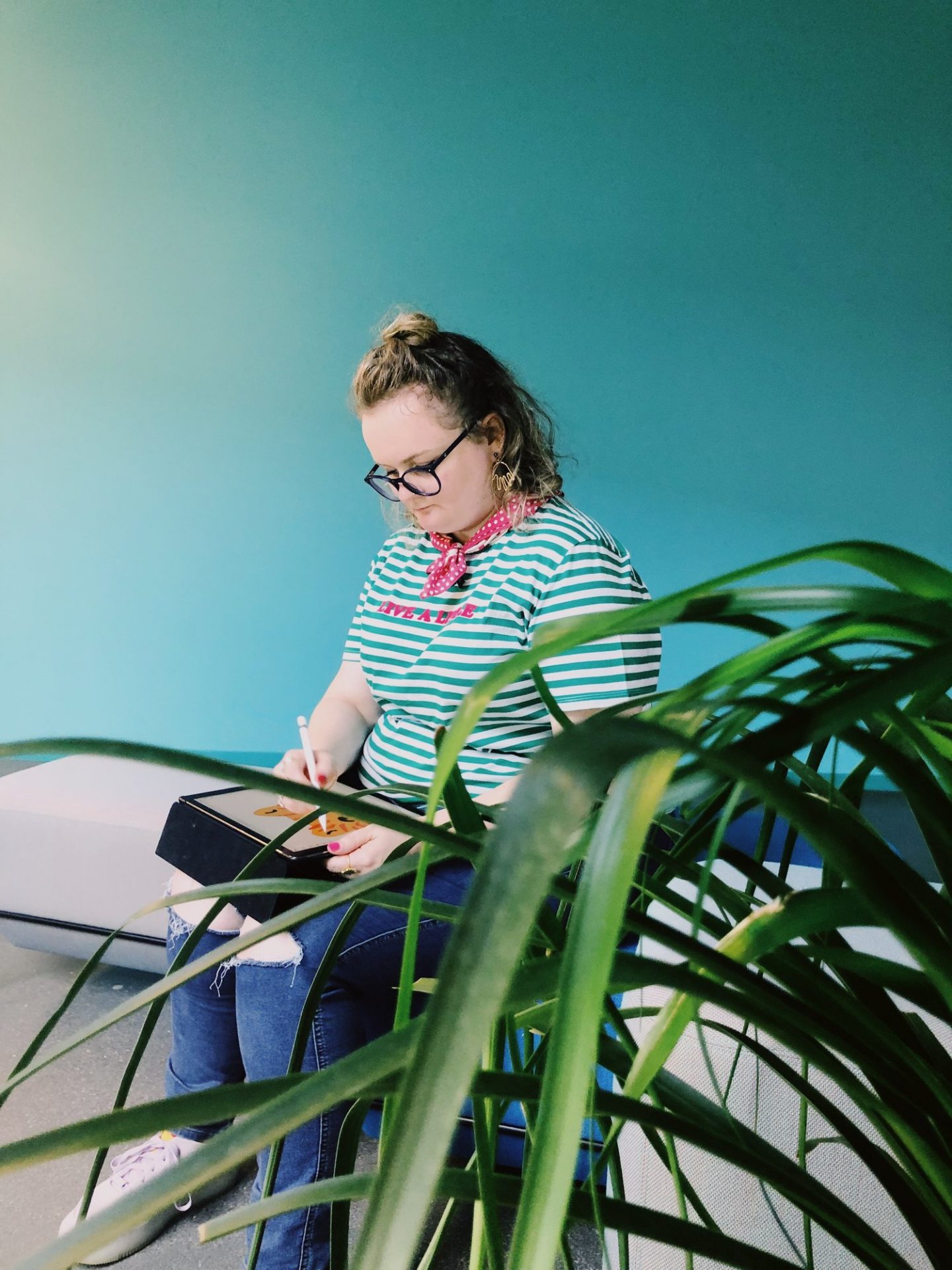
Do you feel you’ve found your creative voice through all of this?
I would say I’m fairly confident in my style at this point. But I think that perspective is only there because so many amazing, weird, crazy things have happened to me during residency that I don’t have time to freak out about them anymore. It’s the same with my work. People seem to keep hiring me to do the things I want to do and they like the style that I want to draw. That’s given me the confidence to say that I’m secure in my style.
It’s actually one of the most common questions I get asked, because I do a lot of speaking on creativity and mental health. People ask me all the time about how to find your style as an artist – because it’s this complex, elusive thing that a lot of people struggle with. I’m a firm believer that whatever you create, is your style.
I’m a firm believer that whatever you create, is your style.
I think the reason a lot of people struggle to say, “Yes, I’ve found my voice,” is because they see it as this concrete thing. It’s like a destination that you get to and then you think, “Yay, I can tick that box.” But I don’t think that that’s something that, as creatives, you ever actually achieve. I don’t believe it’s a point you get to. So I feel like I have a style, simply because I’m drawing things.
Do you feel that you’ve either had or still have Imposter Syndrome?
Oh my gosh – Imposter Syndrome’s my best friend! Especially with the residency, I’m constantly somehow finding myself in rooms with people I’d never expect to meet in a million years. I have this constant feeling that they’ve sent the email to the wrong person. Or that someone’s going to realise and tap me on the shoulder and say, “Actually, we didn’t want you for the residency. We meant this other person.” It’s just one of those things that you just have to go with the flow, although I know that’s so much easier said than done. I am fortunate that because I’m so busy, I don’t really have the time to sit and freak out about it, which is a really nice problem to have. But yeah, Imposter Syndrome’s something I deal with every day, without exception.
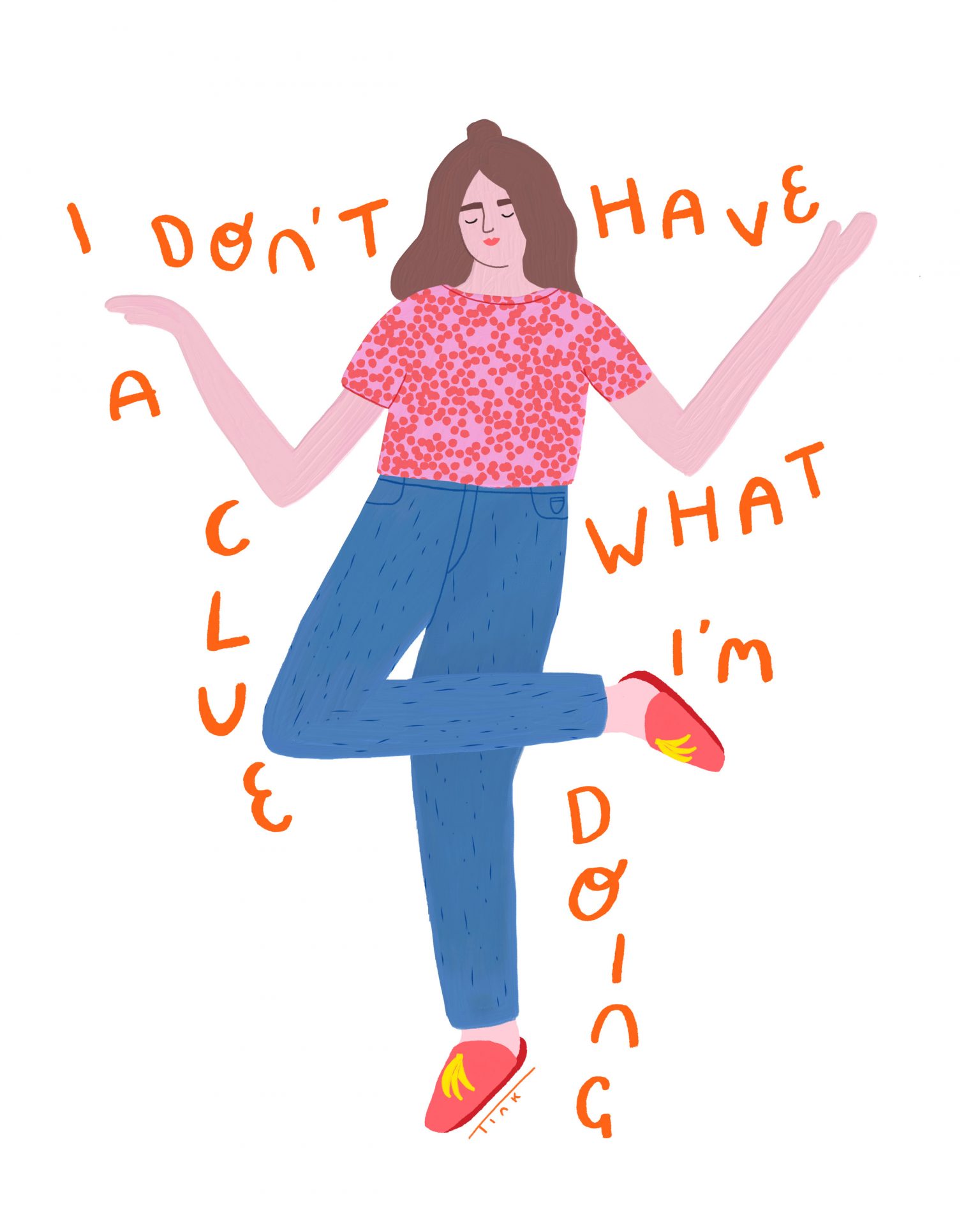
Do you have any general advice for people who are struggling with mental health issues?
The biggest thing I would say is, talk to someone. It doesn’t matter if it’s your best friend or a family member, a therapist, a doctor, or a third party who has no interest in your life. I think that’s the single most important thing you can be doing, which is hard because it’s also the scariest. It’s the one thing that your brain tells you is the last thing on the planet that you should be doing. But I would just try and have courage and talk to someone. I think that without exception, you will be amazed at how compassionate people are and also by how many people go through it. It astonishes me every day.
I talk to people about it every day, and I’m constantly overwhelmed with people saying, “I’m going through this,” or “I’ve gone through this,” or “My sister’s best friend’s cousin’s aunt has gone through it.” It just impacts everyone in some way.
Just make sure you’re looking after yourself. If you do need help, please just ask for it, because situations can turn out badly. Luckily it didn’t happen to me, which is why I’ve decided to talk to people about it.
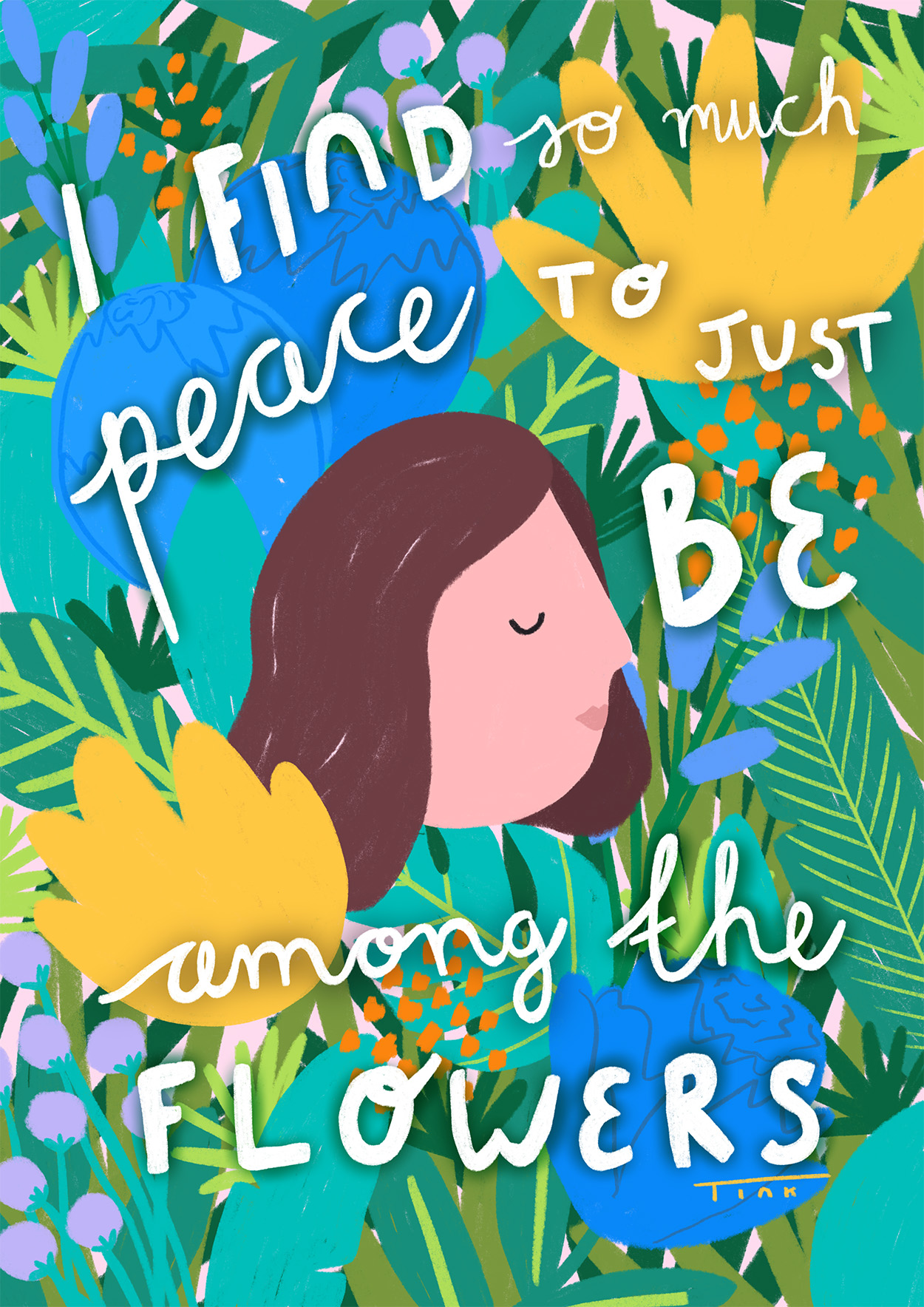
How has the Adobe residency impacted your life?
I would never be able to express in under a thousand words quite how big an impact it’s had on my life for the better, and also how understanding the team are, whatever your circumstances are. I was completely honest in my application. They knew I had depression, they knew I had suicidal thoughts sometimes, they knew I had anxiety, and yet they’re so accommodating with everything. They just want to see you thrive. It’s been a once-in-a-lifetime opportunity and I’m very lucky to have had it.
What are your plans for when the Adobe residency ends?
I would love to just continue bringing joy into my own life, because somehow that seems to be a good way of bringing joy into other people’s.
I would love to just continue bringing joy into my own life, because somehow that seems to be a good way of bringing joy into other people’s.
To find out more about the Adobe Creative Residency program, head over here.
…………..
PHOTOS AND ARTWORK COURTESY OF OCTAVIA BROMELL / TINK OUTSIDE THE BOX.
If you, or anyone you know, needs help – crisis support services can be reached 24 hours a day: Lifeline 13 11 14; Suicide Call Back Service 1300 659 467; Kids Helpline 1800 55 1800; MensLine Australia 1300 78 99 78; Beyond Blue 1300 22 4636


